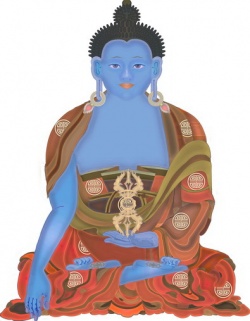The Ten Non-Virtuous Actions and Their Results
The Ten Non-Virtues or paths of karma, comes from the Great Book on the Steps of the Path (Lam Rim Chen Mo),
by Je Tsongkhapa: the Chapter on the True, and the Sutra on the Ten Levels, describe the results,
or "consistent consequences," associated with each of the ten non-virtues.
Avoiding the ten non-virtues is the basis of all ethical living. Leading an ethical life can bring you to nirvana.
If there's something in your life that you do not like, you can figure out the karmic cause and remove it by cleaning up your thoughts and behaviour.
You focus on removing the causes (unethical conduct) that create future consequences.
We constantly do all ten non-virtues.
The understanding of the relationship between the ten non-virtues and the resulting quality of your life should run your life, based on a rational analysis of your current sufferings, what caused them, and how to stop them in the future.
To get the full bad karma from these ten misdeeds, you must be doing them intentionally, to the point of completion, with clear understanding of the error, and with harmful thoughts in your mind (the strength of the result depends on all four factors being present).
In Canada, we generally refrain from misdeeds either because of an external authority like God, parents, social norms, or the law; or because of the embarrassment of doing it in public.
These are irrelevant myths or bases of ethical conduct. Our proper motivation should be to stop planting bad seeds in our mind so that we can reach nirvana.
Je Tsongkhapa states, "Great Lamas of the past have expressed the position that the 'Consistent Consequence' is where, even if you do manage to take birth as a human, you enjoy killing things, etc.;
and that experiencing the various results listed below is a 'Ripened Consequence."'
Finally, 'Environmental Consequences' relate to the land and the surroundings in which you live.
The following presentation defines the misdeed, and for each misdeed lists the "consistent result" (the personal consequence you experience because you have done that specific misdeed), and the "environmental result" (the characteristics you perceive in your environment because you have done the misdeed).
Results of Doing the Ten Non-Virtues
It includes abortion, suicide (ruining a body that could have reached nirvana in this life), and participating in the military (even being a cook, it is as if you shot the gun yourself).
Personal Result: Your life is short; and you get sick easily, have little energy.
Environmental Result: Food, drink, medicine, crops, have very little effect, are always inferior, are not nutritious, are hard to digest, and cause disease in you.
Most beings around you die before reaching the end of a full life.
2. Stealing anything of value: includes shady business deals, cheating on rent, taxes, or bills, underpaying what is due to local government or society, etc.
Personal Result: You do not have enough to live on or to make ends meet; and what you do have is all just common property with others.
Environmental Result: The crops are few and far between, they have no power to remove hunger, they spoil or never come up; dry spells stay on too long; it rains too much; the crops dry up or die off.
3. Sexual Misconduct. It mainly means adultery - cheating on your partner, a person to whom you are exclusively committed. It also includes some specific secondary behaviors.
Personal Result: The people who work around you are "inconsistent" (unreliable); and you find yourself having a lot of competition for your partner.
Environmental Result: You live in a place where there is urine and feces all around, and mud, dirt, filth; everything stinks and everywhere seems unpleasant and distasteful.
4. Lying, giving someone else a wrong impression about what you have seen, believe, or know; unless it would save someone's life or prevent real suffering. If you lie and get something, the benefit comes from past good deeds, not from the lie.
Personal Result: No one believes what you say; even when you are speaking the truth, others are always deceiving you.
Environmental Result: Your work in cooperation with others fails to prosper and people around you do not work well together; everyone generally is cheating one another and is afraid, and there are many things to be afraid of.
5. Divisive Talk, splitting people up with your talk; saying things to alienate or separate two different people, (regardless of whether or not your words are true); causing one person to like another person less; it is usually subtle, like in your tone of voice.
Personal Result: You lose friends easily; people around you are always fighting one another; and people around you have an undesirable character.
Environmental Result: The ground you live in is split up, uneven, covered with crags and gullies, highs and lows, so travel is difficult and you are always afraid and there are many things to be afraid of.
6. Harsh Talk, with bad intent and effect; it includes sarcastic "nice" words and swearing. Personal Result: You hear many unpleasant things, you hear things as bad sounds; and when others talk to you it always seems to you as if they want to start a fight.
Environmental Result: The ground where you live is covered with obstacles like fallen tree trunks, thorns, stones, sharp broken glass; it is rough, dreary, no streams or water springs; the ground is parched and poisoned, burning hot and threatening; there are many things to fear.
7. Idle Talk, meaningless chatter, criticism, disputes, useless joking, whining, complaining, speaking out of the motive of attachment or craving; gossiping about politics, sports, etc., or about people engaged in wrong livelihood; reciting prayers while not thinking about their meaning.
Gossiping about others' values or spiritual practice. Dharma is sacred and should be discussed in holy private whispers on special nights, not casually - talk in hushed tones, very beautiful sacred speech, talk about inspiring things.
As an aspiring bodhisattva, you may need to discuss mundane topics with others for their benefit, but keep the ultimate goal in mind, and do not be drawn into worldly conversations.
Personal Result: No one listens to you; no one respects what you say - no one thinks that what you say has any particular value; and you are afflicted with a lack of confidence and self-esteem.
Environmental Result: Fruits refuse to grow, or grow at the wrong times, seem ripe when they are not, have frail roots; there are no leisure places around like parks, or pools of cool water; many things around make you afraid.
8. Craving/Coveting, is similar to coveting in the Ten Commandments. Wanting others' possessions and personal qualities like their intelligence, health, fame, youth, or spiritual achievements.
It comes in five stages: you are attached to your own possessions, desire to accumulate more than you have, discover another's possessions, like to make them your own, and the desire becomes unmanageable and you "lose shame" (then you act).
Personal Result: Your personality is dominated by desire; and you are never satisfied with what you have. Environmental Result: Every good thing you manage to find starts to get worse, decrease as days, months, and seasons pass.
9. Ill-Will, is to wish bad things upon others; being pleased when others fail or have misfortune; competitiveness, like "Oh, how did they mess up? Tell me more..." not feeling as bad for an unfortunate person as you would feel for yourself if you were them.
Personal Result: Your personality is dominated by anger; you are always finding yourself without help, or never find the help you need; and you are always hurting others, or always being hurt by others.
Environmental Result: You live in a world of chaos, diseases spread, evil is everywhere, plague, conflict, fear of harm from the military, dangerous animals, you are surrounded by harmful spirits, thieves or muggers, etc.
10. Wrong View, "Incorrect world view" means not regarding karma as being the direct cause of every microsecond of experience we have. This leads to doing misdeeds #1-9.
Personal Result: Your personality is dominated by stupidity; you are a person who keeps harmful views; and you are a deceitful person.
Environmental Result: You live in a world where the single highest source of happiness is steadily disappearing from the earth; where people think that unclean and suffering things are actually nice and happy; where there is no place to go, no one to help you, nothing to protect you.
Four Types of Karmic Results
Committing the ten misdeeds leads to these four types of karmic results:
1. Nam Min
A ripening result, - (as in the ripening of fruit or a blister). It means "to be ready, inclined to experience the result," and refers to the realm in which your rebirth will occur:
Big bad deeds lead to birth in the hell realm.
Medium bad deeds lead to birth in the craving spirit (preta) realm.
Small bad deeds lead to birth in the animal realm.
2. Gyu Tun
cause consistent - A result consistent with the cause, consistent with the karmic cause you have cause consistent personally created. The great scriptures list two consistent causes for each misdeed.
For example, if you killed other beings, your own life will be short, and/or you will get sick easily.
Based on your knowledge of these cause and effect relationships, you can determine the specific causes and design a future that is free of these sufferings.
3. Consistent Consistent karmic result, Je Tsongkhapa says that great lamas of our lineage have described another kind of consistent cause which is the tendency to do the same misdeed over and over again in the future, to be attracted to doing the misdeed. It means attraction toward ingrained habits.
4. Environmental Environmental results relate to how you experience the physical earth and society in which you live - the world around you.
The karma of committing not to do these ten misdeeds is an exercise of renunciation, not just something cool to do.
There is no way to fundamentally change the external world around you; rather, you should have intelligent self-interest and eliminate bad karma in order to change what you don't like about your own experience.
The vows are the way to remove your unhappiness.
You will notice how your life changes, and it is great fun, makes your life charmed, magical, special, beautiful.
Forget about shamatha, vipashyana and other tricks for the time being, you must be purified first.
Source
http://www.gadensamtenling.org/007-dharmapractice/007b.doctrine/007b.TenNonVirtuous.htm








